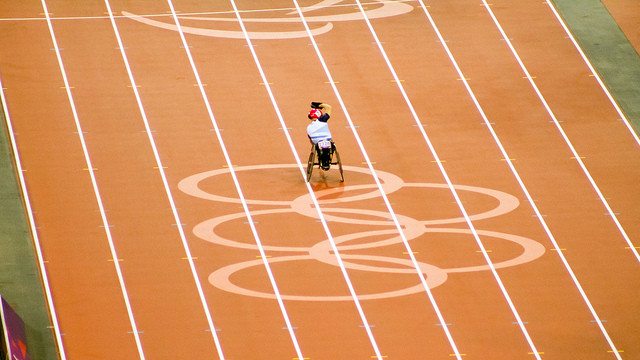The jury is out on the ‘Paralympic legacy’
Earlier this month the chairwoman of disabled charity Scope, Alice Maynard, declared that the ‘jury was out’ on the ‘legacy’ of the Paralympic Games.
Her verdict, delivered so soon after an entire nation rallied around the achievements of our Paralympic heroes, seemed particularly damning and surprising. So I decided to undertake an investigation of that much-fabled ‘legacy’ here on campus.
Fortunately, the Warwick Wheelchair Racing Academy agreed to have me attend one of their training sessions, held at Westwood running track.
I joined them on a cold wet Sunday, slightly regretting the fact I hadn’t elected to remain at home. But by the end of the session I was delighted I had braved the elements, such was the infectious enthusiasm of everybody I spoke to.
The group pride themselves on their inclusivity, and I first spoke to the parents and grandparents of two junior racers: nine-year-old Hollie and ten-year-old Jessica.
A common theme of these discussions was the hefty financial implications of disability sport. Hollie’s grandmother told me of the difficulty in winning sponsorship for the construction of a custom-built racing chair for Hollie: ‘it feels like begging’, she told me.
The need for better chairs was typified by Jessica’s continuing struggles: it took a good 20 minutes for her borrowed chair to set up properly according to her needs. This was 20 minutes well spent however, for she later set a personal best of 30.7 seconds in the 100m.
17-year-old Ben Rowlings also mentioned the financial struggles disabled athletes have to contend with.
He’s currently seeking sponsorship for a £3500 replacement to his current racing-chair ‘Bruce’ (‘I spend more time with him than I do my family, so I had to name him’, he told me).
It appears these financial implications can be overcome, however. He has competed in Abu Dhabi and Switzerland, and travels to campus from Shropshire twice a week, as well as training in Kenilworth on Monday nights. And I thought getting up for a 9am lecture showed commitment.
In his final year of A-Levels, Ben is currently navigating the UCAS system, far tougher than any race for sure.
He tells me he’s aiming for a place at Coventry University, because of its close proximity to the track and the university’s good reputation for disability sport.
Warwick doesn’t seem to share this positive reputation, which can’t be helped by a total dearth of information regarding disability sport on both the Warwick SU and Warwick Sport websites.
In just the session I attend, Ben completes around 30 laps of the track, explaining why his biceps are about the same size as my neck. Unsurprisingly, Rio 2016 is a serious target for him.
I asked Ben why he travelled to Coventry instead of staying closer to home. ‘This is a career for me’, he said. ‘I travel from so far away because this is the quickest track around, as well as because of Job’.
He refers to Job King, coach and founder of the group set up in 2011. Unassuming and understated, Job tells me that when the group started, they had only about three or four members, and that the team was informal and amateur.
Now, Job presides over an eclectic and dedicated team of athletes. He’s coached Ben from his first race to international tournaments, and he tells me that this is one of the aspects of his job that he enjoys the most. ‘It’s nice to see athletes being successful when you’ve seen them start out’, he says.
Of course steering the group to success hasn’t been an entirely painless endeavour for Job. Initially competitions and racing chairs were hard to come by; the chairs the club currently own have either been donated by other racers or have been paid for by Job out of his own back pocket.
His enthusiasm is constant as he speaks with a quiet and firm confidence about the future of the group. I ask him about the legacy, initially the point of this article, but he shakes the question off.
‘People speak about the ‘legacy’, but if there was a legacy it happened before the Games’, he says. ‘I try to ignore the political stuff and focus on the sport’.
He does, however, believe attitudes to disability sport have changed for the better. ‘Disability sport is no longer seen as a hobby, and the people who train here are now seen as athletes’.
My conversation with Job brought my time with the group to an all-too-soon conclusion. I came to the training session with the intention of learning everything I could about the Paralympic ‘legacy’, believing it to be the biggest issue in disability sport.
However, I now realize this to be too naïve an intention. After the conversations I had with people, it struck me that the ‘legacy’ seemed nothing more than media hyperbole, a political statement and concern, with little relevance to the sport itself.
The extreme enthusiasm and commitment disabled athletes demonstrate has not changed, nor, unfortunately, have the funding issues that preceded the Games.
It is time to move on from this cyclical discussion of ‘legacy’.

Comments